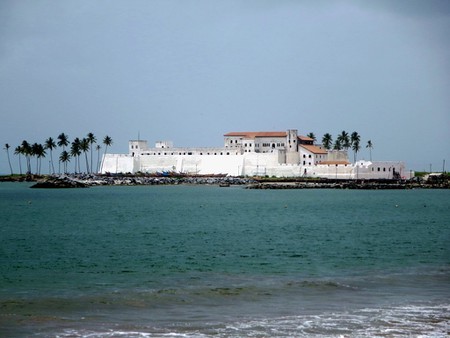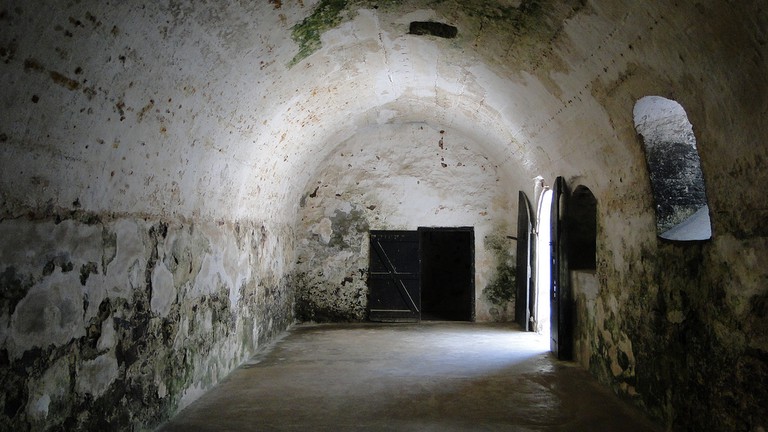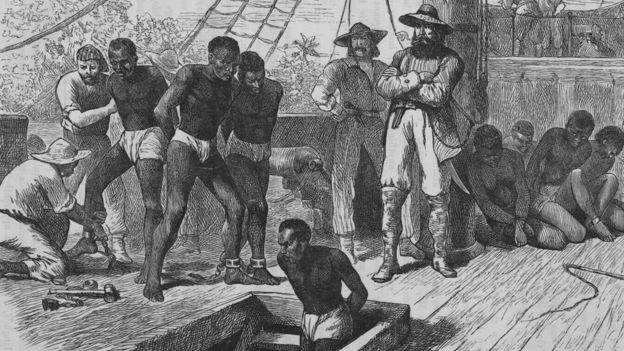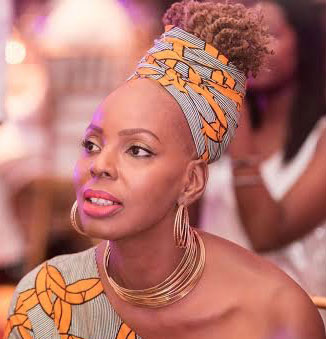1619. Not a date. A severing, a stealing, a story. Stories. I am standing at Cape Coast castle, in Ghana’s central region. It was from this place 400 years ago this month that a ship departed carrying more than 20 Africans. We call it a "castle" here in Ghana. Strange name. This living tomb that snatched the freedom of Africans, wrapped the horrors of bondage around necks, ankles and souls so they became enslaved.
Those 20 arrived in the English colony of Virginia.
It was the beginning of a breaking.
There were those Africans stolen from homes, families, communities, robbed of culture and language. And there were those who stayed – those families and communities from whom they were stolen.
We are the stayed and the stolen. We are Africans and African-Americans.
Princeton Professor Matthew Desmond’s blistering and brutal piece, "American Capitalism Is Brutal. You Can Trace That to the Plantation" from the #1619project places the roots of modern-day American capitalism on the plantation. It is there, he reveals, that the shaping of America’s modern economy was honed, molded and perfected.
I invite us to engage our emotional economy. This too was built, and honed within enslavement. Just as Desmond outlined the labor structure developed on the plantation, an emotional economy was about emotional labor.
Cape Coast Castle, Ghana: The holding cells, and graveyards, for millions of Africans before being taken across the Atlantic.
Elmina Castle: It was here that Yaa Asantewa, the warrior Ghanaian woman who confronted the British was brought and held.
Our emotional economy focuses on how human emotions were racialized. Using so-called science, they were then weaponized and mechanized to justify the most brutal of treatment. Feelings of anger, hurt, sadness, tears, vulnerability, rage, pain, threat, fear and forgiveness became integral parts of a structure used to uphold and maintain ideas of who we are, how we move through the world, whether or not we can be trusted or get helped and what purpose we serve.
Our human emotions became an Emotionality. With Emotionality, a feeling becomes a description, a characteristic that personifies someone’s nature, indeed that of an entire group of people. With emotions, an individual person feels something due to a circumstance or situation. It is not permanent and as the situation changes, the emotions will change.
Within this context Emotionality is much more than feelings, it is structure - one that sustains injustice and perpetuates an abuse of power dynamics between peoples; Black and white folk, Black men and Black women; white men and white women. In such an economy, there are feelings that trigger empathy and those that trigger suspicion.
I am not saying emotions have color. I am saying that emotionality has been stitched into the fabric of a structure colored by injustice, violence, power, gender, race, threat, fear and the illusion of white superiority.
Anger in the body of a white man is received, understood and treated differently than anger in the body of a Black woman. In the body of a white man anger is emotion; but in the body of a Black woman it is disqualification. Fear can become threat in the body of a black man; but in that of a white woman or man, it is simply fear – an emotion that merits empathy.
When Emotionality is defined as a characteristic that represents a group of people in a context of race, gender, power, fear, threat as part of a structure of race-based injustice, then human emotions shift from empathy to judgment. Emotionality was engaged as a tool and deployed as a weapon depending on whose body the emotion shows up in. Those transformations are lethal. They threaten lives, steal dreams and ultimately erode humanity.
Structural emotionality lingers. Our emotional economy holds our legacy of untreated trauma, shapes our loving, leading, building. It breaks and binds us. And it needs a particular attention for healing. It needs Emotional Justice.
The racialization of our emotionality, and the economy of violence from enslavement shifted how we hold, see, engage, lead and love each other as the stayed and the stolen, as black people globally, as Africans and African-Americans.
In this structure, Black folk had an intimate relationship with violence and white folk had an intimate relationship with power based on the illusion of white superiority.
Emotional Economy runs on an engine that I call "Emotional Patriarchy."
It is a system in which the feelings, needs, hurts, harm, sadness, strength of white men matter more than anything or anyone else. They are centralized, prioritized and privileged, no matter the cost or consequence to family, community, society or country. Anything must be done to protect that emotional patriarchy.
Emotional Patriarchy within an Emotionality Economy is personal, familial, societal, professional, political, presidential and criminal. It impacts all spheres of our lives. It affects all men and all women; but it always benefits white men. Everyone else loses.
Just as Patriarchy is a global beast; Emotional Patriarchy is equally global.
With masculinity that means only dominion over another makes you a man to reckon with and respect. Reverence matters. Submission matters in such a masculinity from an Enslavement-built Emotional Economy.
All Economies have currencies.
In an Emotionality Economy the currency is women; Black women and white women. They are exchanged, their worth fluctuates. There is a bottom line to consider. They appreciate and depreciate.
As with all economies, not all currency holds the same worth. In an Emotional Economy, there is a hierarchy; who matters, how much and how that mattering manifests. In an Emotionality Economy, all women – but especially Black women – are perpetually in the emotional missionary position. They are never on top.
An Emotional Economy does not have an #AllCurrenciesMatter structure.
In an Emotional Patriarchy, your currency is connected to the continued centralization of white men. And there is a ladder. Its rungs hold the intersections of race, gender, power, fear, threat and the illusion of white superiority.
With white and black women, we have navigated, reckoned with, resisted and reeled from the myriad ways emotionality manifests between us. Black women have been expected to be ‘emotional mammys’ to white women; always taking care of their feelings, centering them, protecting and privileging them. This ‘emotional mammydom’ is the emotionality equivalent of the physical mammys that cared for white women, raised their children during enslavement.
The contemporary manifestation raises its head with reckonings around racism, and the calling out of racist words or behavior. The call-out of white women by black women triggers white women behavior that when it comes to racism they occupy the Republic of Benefit-Of-The-Doubt and are permanent residents of the State-Of-Good-Intentions.
And then there is the ways we as black folk globally – as Africans and African-Americans love, blame, hurt, berate, engage each other.
Emotional patriarchy is deep within us too.
When it comes to the ways black men and black women engage, love, build and lead, injustice and the cycles of violence that upheld it, have shaped our hearts. We have all bent to the rhythm that is white supremacy. And although we did not become slaves to that rhythm - there was always resistance, revolution and a fight for independence - freedom did not release global Black folk from legacies of untreated trauma.
Black girls and women are so often treated as currency in our communities - across America and in too many nations here in Africa. There is the privileging and protecting of black men at the cost of the safety and wellbeing of black girls and women. There are the ways we circle and defend black men who abuse, and disbelieve and disregard the stories of black women and girls. From Ghana to Georgia, that truth is tragedy that holds legacy.
As Africans and African-Americans, the stayed and the stolen - we swing at each other.
We point at each other and ridicule what was lost. Too many Africans - the stayed - berate some African-Americans - the stolen - for their absence of language. And some of the stolen point fingers at too many of the stayed and curse their Western mentality. We are both infected by the stench of white supremacy. We may not move the same to its cancerous rhythm, but its cancer cuts, burns and bleeds.
We swing through accusations of cultural appropriation. The stayed lament that you do not wear your culture as we wear ours. How can you steal what was always yours? The stolen are the unmixed remix. Can we reckon with the remix? I invite us to remember we are still wearing what is familiar.
Fragments of family, finding our way back to one another navigating rocky waters and rockier wounds. You who are descendants of the stolen reach back, and we who are the stayed watch as you open your arms. Some from the stayed stare, arms closed, asking who are you? Others, throats swimming in belonging and blessing, say akwaaba and invite the stolen to breathe racial-violence free air.
As a black global fragmented family, we have turned the emotions that were turned against us, against each other. Historically, strong was not antithetical to soft in a woman. Soft was not weak, not a character flaw, not punk, but more like the beauty of shea-buttered brown skin, smooth and delicious to the touch. Just as softness was not antithetical to masculine in a man, more like the making of his masculinity.
We love each other brutally as well as beautifully. We shame each other, using it to keep each other in line. We found homes in the violence, the fatally familiar. It has been a landscape, laid waste by unmourned losses and countless betrayals. Our wounds are manifest in our journeys to each other’s and within each other’s lands. There was betrayal and the burying of what lies between us.
There is also, of course, what stayed within the stolen and your descendants, that reminds us we are family.
When I walk down Brooklyn streets and watch some brothas roll down the block with swagger for days, I see the Yoruba of Nigeria. I peeped the pride of the Asante in Black girl magic in Chicago. I saw the hustler spirit and was reminded of Lagos. I witnessed the don’t-fuck-wit-me vibe and there lay the Zulu. You fashioned a culture rich with longing, legacy, love and leaving – it is in your food, your fashion, your hair, your sound. It is the soundtrack of resistance, carried over shores and ripples, in waves and wonder.
I walk down Accra’s streets and watch men greet each other with affection, wrap their arms around each other, walk down the streets and hold hands – that was love, friendship and unsexualized pleasure - not a statement of sexuality or identity. Contemporary times mean such affection more often comes tagged with slurs and hurt.
Ghana’s first president, Kwame Nkrumah, was a pan-Africanist. It was African-Americans that partially shaped his political leaning. Your resistance and revolution was inspiration.
We both created resistance movements.
There is no perfect Africa to return too. We too were broken because you were stolen. We are family. But we are in fragments. Lack of perfection does not mean an absence of beauty, though. There is certainly no perfect America. But these are homes for us both.
The challenge of Emotionality is it manifests in the ways we live, love, build and lead. It is about intimacy and it is individual. It is structural and collective.
The result of that is what I call colliding traumas.
That makes engaging it the toughest of conversations.
With these colliding traumas, we are collecting bodies, bruises and deepening existing wounds with our refusal to recognize that we both lost. Parts of our family, our community, our future and all the beauty, talent and possibility that entailed are gone.
Emotional Justice is key to transforming loss into wins; and making profitable progress.
I come from those who stayed. My parents born and raised in villages on this West Coast of Africa. My mama is from the Asante tribe, that of the warrior, Yaa Asentewa who was held at Elmina "Castle". My pops, an Nzema man, born and raised in the village of Anochie.
You are seed of the stolen. Descendants, an inheritance of resistance, reckoning, risk, built, bruised, broken, bodied, unburied.
You cannot lecture me on our mentality, while I lambast you for yours. So much more than water lies between us.
1.6.1.9. It wasn’t a beginning, it was a breaking – one that would stretch for four hundred years and leave wounds still unlanguaged.
Unhealing lives between us, and within us. The unburied do too. They are stuffed deep in our throats, their traumas, their truths, their triumph and tragedies all wrapped around our nappyness, coiled, and braided and weaved and Caesar-cut faded. We died, we did not die.
From our family fragments we can create our emotional economy. That economy means reimagining family, connection, ritual, culture. We cannot be the family we once were. How might we reimagine our union? How do we find what stayed, even as we mourn what was stolen, resist further stealing and rally for rights still being choked out of us?
We cannot recreate what has been severed, and what was built in the hundreds of years between us. We have endured horrors, and legacies of horrors. They have been carried womb to womb.
We must be builders and bridges for each other’s healing.
Say our names – not African-American or African - but a reimagining of family.
We cannot hold each other with capitalism’s arms. They choke, strangle and oppress – there is no bridge to each other from that. Those arms are not built to acknowledge wounds, much less heal them, only to deepen wounds and leverage the horror for profit.
Home cannot look as it did. It cannot be what it was. The stolen cannot make a home from what was lost. The stayed can’t make a home from what was taken.
But the glory we could create from the healing we could do, the wading in these waters that still hold unshed tears from the middle passage.
Emotional Justice requires our intimate reckoning. That is how we rebuild our black global family.
What might that family feel like, what faith and freedom would it, could it carry? What future might we build?
Desmond’s piece reminds us enslavement built a brutal American capitalism, a superpower, a modern democracy and economy.
Imagine what black global healing could build.
The #1619project is a major initiative observing the 400th anniversary of the beginning of American slavery. It is curated by Dr. Nikole Hannah-Jones for the New York Times. It examines the legacy of slavery and reframes 1619 as America's true founding as a democracy, centralizing the contributions of black Americans, and the consequences of slavery. It features essays, photography, creative writing and poems. "American Capitalism Is Brutal: You Can Trace that to the Plantation" is written by Matthew Desmond, a professor of sociology at Princeton University and a contributing writer for the New York Times magazine.
*the STAYED & the STOLEN is an Emotional Justice project dealing with the relationship between Africans and African Americans in honor of the 400-year anniversary of Enslavement. The first live event will be at ‘Black Portraiture[s] V: Memory and the Archive. Past/Present/Future’, October 17th 1.30pm. It features dance, music, panel discussion with Esther Armah, Joan Morgan, Pearl Korkor Darkey.
Twitter @estherarmah
Esther A. Armah is an international award-winning journalist. She works across print, radio, television and theatre. She is Director of EAA Media Productions. She is a columnist for Ghana’s Business & Financial Times focusing on media, gender, policy and violence and host, creator and Executive Producer of “The Spin,” a weekly one hour all women of color round table podcast that airs in the US, London, Ghana and Nigeria. She is the creator of “Emotional Justice;” a language, process and practice exploring a legacy of untreated trauma due to global histories of black peoples and their contemporary manifestations.




